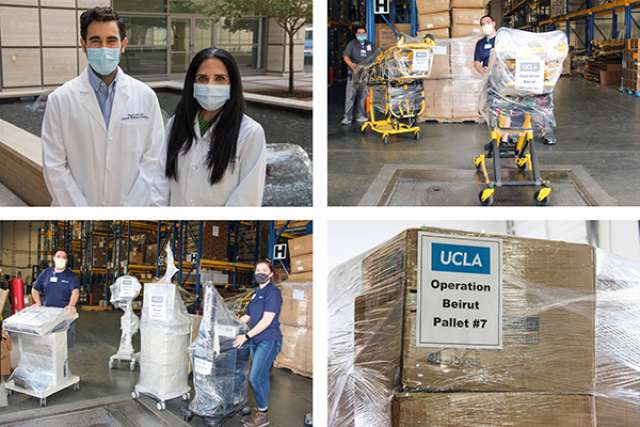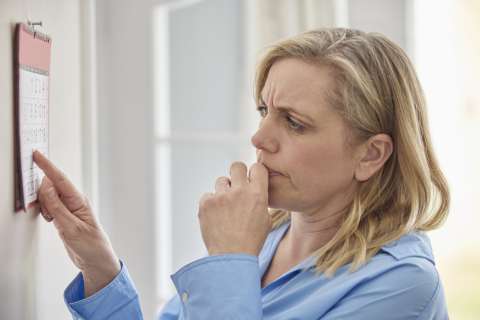Thousands of masks, face shields and safety goggles. Hundreds of bottles of hand sanitizer and soap, syringes, sutures, gloves and burn dressings. Dozens of procedure gowns and tourniquet kits. Four EMT gurneys. Two AESOP robotic surgical arm units. Two arthroscopic carts. Two Site Rite mobile ultrasound machines and one diagnostic ultrasound machine. These are just some of the items found in the 13 pallets of medical supplies and personal protective equipment UCLA Health recently shipped to Beirut, Lebanon, to aid those still in need two months after a tragic explosion devastated the city.
"The fact that we are sending this substantial donation of medical supplies is absolutely remarkable," said Dr. Neveen El-Farra, professor of clinical medicine at the David Geffen School of Medicine at UCLA and one of the chief organizers of the humanitarian effort. "It exemplifies UCLA Health's commitment to the global community. It aligns with our vision of healing humankind one patient at a time by alleviating suffering and delivering acts of kindness."
Even from 7,460 miles away, the unofficial UCLA response to the massive explosion of 2,750 metric tons of ammonium nitrate on Aug. 4 that killed 137, injured more than 5,000 and displaced another 300,000 people from their homes, was immediate.
"After the explosion, I was literally three clicks away online from buying my flight there because I wanted to help," said Dr. Faysal Saab, assistant clinical professor of internal medicine and pediatrics in the David Geffen School of Medicine at UCLA. Saab was born in Lebanon and lived there until his family immigrated to the U.S. when he was 2 years old. "My sister was at that blast site 30 minutes before the explosion. The tragedy just hit very close to home."
Robert Hernandez/UCLA
Equipment sent for Operation Beirut
El-Farra, an Arab American physician, felt a similar urge to help immediately. "When I heard about the news in Lebanon, my heart broke," she said. "I can't even begin to conceptualize the extreme hardship that the Lebanese people are facing. After months of struggling with the COVID-19 pandemic — in already underresourced settings — this explosion has crippled the health systems in Beirut and the lives of so many.
"As a physician, I have a genuine desire to participate in humanitarian efforts to help people around the world. I have had the privilege to work on relief efforts for peoples across the Middle East who are in desperate need of aid. I have many close friends who have family in Beirut who have been deeply affected by recent events," she added.
Saab, who serves on the board of the American Lebanese Medical Association's Los Angeles chapter, already had experience getting medical materials to the clinics and hospitals that need them during this crisis through his involvement with the Lebanon Relief Project and Direct Relief. These organizations had already been facilitating delivery of donations to Lebanon. Thank goodness for these groups, because the more common way UCLA doctors provide aid was short circuited by COVID-19.
"Faysal's initial reaction was, 'I need to get on a plane and go help,'" El-Farra said. "And when other humanitarian crises happened in the past, a group of UCLA physicians would get together and travel to the region to provide medical assistance. Faysal and I would have been on a plane along with several other physicians who we are blessed to work and partner with, but for this humanitarian mission our ability to travel was limited by the pandemic."
And of course with COVID-19, the need was even greater than it would have been.
"The health infrastructure in Lebanon was critically damaged by the explosion, and there was a lack of medical supplies before the explosion and even prior to the pandemic," El-Farra said. "The number of individuals that live below the poverty line is quite striking, and Lebanon hosts millions of refugees."
UCLA support for the doctors' desire to help
After their initial reactions to somehow help immediately, Saab connected with El-Farra in the hallway between their offices, where they began to strategize on how to best to provide aid in Beirut from where they stood at UCLA.
"Dr. El-Farra had the great idea of meeting with the chancellor. 'We should get his perspective and UCLA's commitment to see what we can all do together.' And that's how it all started," Saab said.
Soon after the professors, as well as Dr. Eric Esrailian, chief of UCLA's Vatche and Tamar Manoukian Division of Digestive Diseases, met with Chancellor Gene Block, who expressed his full support. After their meeting with the chancellor, El-Farra and Saab shifted their focus to engaging with their colleagues.
"At that point, we decided to bring together all the Arab American health care professionals at UCLA, whether they are medical students, residents or fellows, faculty or pharmacists, and let them know, 'Hey, we need to come together right now in this time of crisis. Let’]'s figure out how we as a UCLA Arab American community can best assist our brothers and sisters during their time of need,'" said Saab, who visits Lebanon twice a year and still considers it one of the places he calls home. "That connection is permanent. Your heart never leaves the region."
The combined initial steps led by El-Farra and Saab prompted Dr. John Mazziotta, vice chancellor of UCLA Health Sciences and CEO of UCLA Health — who had been in close contact with the chancellor — to activate his team to put together medical supplies to send to Lebanon. Michael Baca, director of materials management at UCLA Health, helped identify medical equipment that had been replaced in the hospital or had been used as part of a clinic but was still in good working condition.
Robert Hernandez/UCLA
Operation Beirut equipment
At the UCLA Michigan Operations Center in Santa Monica, Medical Aid Initiative — a student-run organization that partners with UCLA Health — brought in volunteers to help with the humanitarian undertaking. Tiffany Tran, the initiative's chief executive director of operations, said they sorted and packaged unused supplies for shipment to Beirut. She worked closely with Becky Mancuso-Winding, executive director of UCLA Health's Strategic Community and Business Relations, who has also been pivotal to UCLA Health's Operation Beirut.
"It was a great opportunity," said Tran, who's on track to graduate in 2021 with a degree in physiological science. "There has not been enough coverage on Beirut and what happened there. Now we're letting people know there is still need for medical supplies in Lebanon."
Rojean Kashanchi, senior director of international business development in UCLA Health International Services, was another key player in the decision-making process and getting the required approvals to ensure a donation of this size could happen.
Helping others is always a priority
"As UCLA, we are an international institution that caters to the needs of the world," Kashanchi said. "It's been beautiful to be involved in such an effort where volunteers of all backgrounds — many who had no connection to Lebanon and the Middle East — came together to help human beings in need on the other side of the world."
El-Farra said that the call to help from UCLA Health has been "nothing short of extraordinary."
"Volunteers, staff and leadership have rallied around this noble cause to provide humanitarian aid to the people of Lebanon," she said. "Colleagues coming together, standing together, from all cultural and religious backgrounds to participate in this effort embodies the spirit of generosity and inclusion at UCLA Health. The work of volunteers and staff culminated in sending much needed humanitarian aid to the people of Beirut. My words can never convey the immense gratitude and heartfelt thanks and appreciation to UCLA leadership and all those who have participated in this effort."
Saab said that while he deeply appreciates how so many people mobilized to this donation of medical supplies from UCLA, the need in Lebanon persists.
“This situation is a marathon, not a sprint, and we know as a community that Lebanon is going to need help for a while," Saab said. "Even after this shipment goes over from UCLA, we, as a community of Arab American health care professionals, intend to continue meeting to figure out how we can keep that momentum going after this acute relief phase is completed. That's just the beauty of what a community can do once they’re connected. We can also call attention to the fact that this crisis is not one in isolation.
"There are several different crises going on, whether it's in Palestine, whether it's in Yemen, whether it's in Syria. There are endless causes that need our attention. How can we, as a UCLA Arab American community, continue to lend a hand and our ideas and connections to support that region even after this time passes?"



